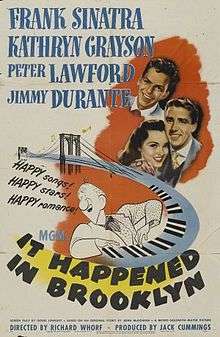It Happened in Brooklyn
| It Happened in Brooklyn | |
|---|---|
 | |
| Directed by | Richard Whorf |
| Produced by | Jack Cummings |
| Written by |
Isobel Lennart J. P. McGowan |
| Starring |
Frank Sinatra Peter Lawford Kathryn Grayson Jimmy Durante |
| Music by | Johnny Green |
| Cinematography | Robert Planck |
| Edited by | Blanche Sewell |
| Distributed by | Metro-Goldwyn-Mayer |
Release dates |
|
Running time | 104 minutes |
| Country | United States |
| Language | English |
| Budget | $1,819,000[1] |
| Box office | $2,664,000[1] |
It Happened in Brooklyn is a 1947 MGM musical romantic comedy film directed by Richard Whorf and starring Frank Sinatra, Kathryn Grayson, Peter Lawford, and Jimmy Durante and featuring Gloria Grahame and Marcy McGuire. It Happened in Brooklyn was Sinatra's third film for Metro-Goldwyn-Mayer, who had purchased his contract from RKO because Louis B. Mayer was a huge Sinatra fan.[2]
The film contains six songs written by Sammy Cahn and Jule Styne, and included "The Song's Gotta Come From the Heart" (performed as a duet by Sinatra and Durante), "The Brooklyn Bridge", "I Believe", "Time After Time", and "It's the Same Old Dream".
Plot
A post-World War II feel-good movie, It Happened in Brooklyn begins in England at the end of the war. Danny Miller (Frank Sinatra) is with a group of GIs awaiting transportation home to the US. On his last night there, he meets Jamie Shellgrove (Peter Lawford), who is a very shy young man whose grandfather feels should be taken under someone's wing. After observing Miller come to his grandson's aid at the piano, he asks Danny to speak with his son, to give him "some words of encouragement". In order to look good in front of the Brooklyn-born nurse (Gloria Grahame) who scolded him for not making friends, he agrees, even going so far as to saying what would really fix Jamie up would be for him to come to Brooklyn. As he rushes out to catch his transport to the docks for the voyage home, Danny discovers that Jamie is really the heir to a duke. Upon Danny's return to Brooklyn, the film revolves around characters realizing their dreams of escaping working-class drudgery: in Sinatra's case to become a singer/musician rather than a shipping clerk, in Lawford's case to break out of his extreme shyness to gain a wife and a career as a songwriter, and in Grayson's case to break out of her schoolteaching job to star in the opera (although this last is not shown coming to pass, but she presumably lives happily ever after as she is brought to England as the fiancée of the Lawford character, who is heir to a dukedom). The story ends with Danny realizing the nurse he talked to at the start of the film is the only girl for him, and since he figures she's got to be back in Brooklyn herself, and he's got all kinds of friends now, he's optimistic about finding and winning her. The film's tagline was "Happy songs! Happy stars! Happy romance!". Lawford dances while singing a song, a performance that was particularly well received by both critics and public, outshining future fellow Rat Pack member Sinatra. One highlight of the film is seeing and hearing Sinatra and Grayson singing "Là ci darem la mano" from Mozart's 1787 opera Don Giovanni.
Filming
The original director was supposed to be George Sidney, but he was replaced by Richard Whorf, who is probably best known for his television directing, particularly The Beverly Hillbillies, Gunsmoke and My Three Sons. Filming was interrupted for approximately ten days when Durante had to go and finish filming on This Time for Keeps. The piano solos in the film were performed by the pianist and composer André Previn.
Box office
The film earned $1,877,000 in the US and Canada and $787,000 elsewhere, resulting a loss of $138,000.[1]
Variety says the film earned $2,150,000 in rentals.[3]
Critical reception
It Happened in Brooklyn was generally well received, Variety noting that: "Much of the lure will result from Frank Sinatra's presence in the cast. Guy's acquired the Bing Crosby knack of nonchalance, throwing away his gag lines with fine aplomb. He kids himself in a couple of hilarious sequences and does a takeoff on Jimmy Durante, with Durante aiding him, that's sockeroo."
References
External links
- It Happened in Brooklyn at the Internet Movie Database
- It Happened in Brooklyn at AllMovie
- Review, Variety